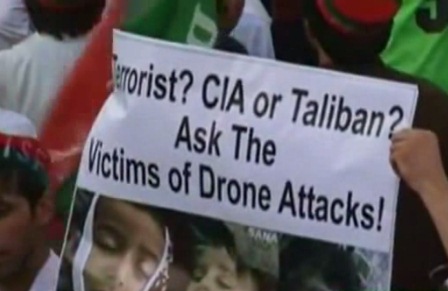 (CNN) -- The United States government is seeking to reject a lawsuit demanding information about drone strikes that target suspected terrorists overseas, saying releasing details on the program would have a major effect on counterterrorism efforts.
(CNN) -- The United States government is seeking to reject a lawsuit demanding information about drone strikes that target suspected terrorists overseas, saying releasing details on the program would have a major effect on counterterrorism efforts.
The American Civil Liberties Union filed the lawsuit in New York after a Freedom of Information Act request they submitted to the Department of Justice, the Department of Defense, and the CIA, was denied. The rights group is seeking the release of a copy of the memo outlining the Obama administration's program that targets suspected terrorists overseas.
In its response, the government asked for a summary judgment dismissing the complaints and defended its decision not to release the requested information.
"Even to describe the number and details of most of these documents would reveal information that could damage the government's counterterrorism efforts," the government said, further maintaining that refusal to disclose the information is consistent with exemptions in the Freedom of Information Act that permit the withholding of records when doing so is in the public interest.
But the ACLU reiterated its call, saying the public is entitled to the information. In a statement early Thursday after the government response, the rights group urged the administration to release information on the program, including the process on how targets are chosen.
"The notion that the CIA's targeted killing program is still a secret is beyond absurd. Senior officials have discussed it, both on the record and off," said Jameel Jaffer, deputy legal director of the ACLU. "They have taken credit for its putative successes, professed it to be legal, and dismissed concerns about civilian casualties. If they can make these claims to the media, they can answer requests under the Freedom of Information Act."
The CIA and the Pentagon use unmanned aircraft to fire missiles at suspected al Qaeda members and other extremists. The controversial drone program started under the Bush administration following the September 11, 2001 terrorist attacks on the U.S. and targeted al Qaeda leaders hiding in ungoverned tribal areas of Pakistan.
The number of attacks escalated after President Barack Obama took office, becoming one of the primary tools in the administration's counterterrorism efforts
Administration officials claim al Qaeda's core leaders have been decimated in Pakistan by the drone strikes. And the attacks are now used more frequently to target suspected members of al Qaeda's affiliate in Yemen.
One of those killed in a Yemen strike was American born-cleric Anwar al-Awlaki. The U.S. says he was head of external operations for al Qaeda in the Arabian Peninsula and was linked to various plots including the so-called underwear bomber who attempted to blow up a U.S. airliner as it headed to Detroit on Christmas Day in 2009.
Human rights and civil liberty groups have criticized the drone program for its secrecy, saying the U.S. has failed to disclose details such as who is killed, how many civilians' deaths have occurred and whether there have been investigations into wrongful killings. Questions include whether targeted killing violates the U.S. constitutional guarantee of due process as well as international law.
But the program has certainly become less secret. Although officials acknowledged the program in private, it was not discussed publicly.
That changed when Obama spoke about drone strikes during an online interview in January. In response to a question, he defended the attacks as being "precise, precision strikes against al Qaeda and their affiliates," and said the program is "kept on a very tight leash."
But the curtain really came down in April, when the president's counterterrorism adviser gave a speech providing the most extensive outline to date of the drone program.
"Yes, in full accordance with the law -- and in order to prevent terrorist attacks on the United States and to save American lives -- the United States government conducts targeted strikes against specific al Qaeda terrorists, sometimes using remotely piloted aircraft, often referred to publicly as drones," John Brennan said.
Brennan described what he called "the rigorous standards and process of review" when the administration considers a strike. But he did not provide any details about who has been killed, where drones are authorized to operate and civilian causalities.
The drone program remains classified despite the acknowledgment by the president and one of his chief aides.
The American Civil Liberties Union has another similar case pending in D.C. federal court, a challenge filed earlier than the one in New York.
In the D.C. case, the government invoked a judicial doctrine known as Glomar, which means the government claims it can neither confirm nor deny the existence of the program. The D.C. court is scheduled to hear arguments in the case in September.
- Home
- News
- Opinion
- Entertainment
- Classified
- About Us
 MLK Breakfast
MLK Breakfast- Community
- Foundation
- Obituaries
- Donate
11-16-2024 6:59 am • PDX and SEA Weather














































































































































































































































































































